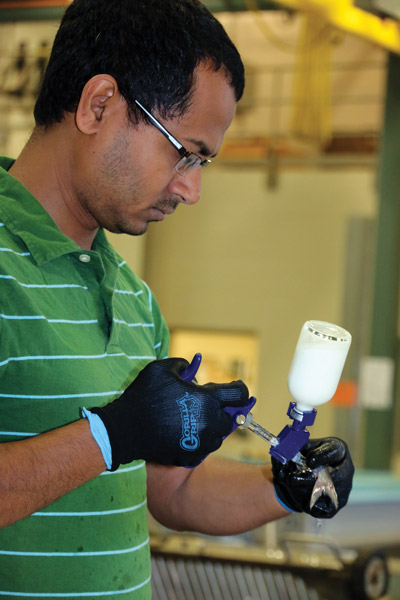Catfish Checkoff Dollars Fund Auburn Research Trials

Farmer checkoff dollars are helping develop a vaccine to stop a pathogen that harms catfish shortly before harvest.
Auburn University researchers began vaccine trials aimed at preventing aeromonas in catfish May 14 by vaccinating 18,000 fingerlings at the E.W. Shell Fisheries Center. Those fish were taken to ponds at Randy Hollingsworth’s farm near Greensboro for scientists to monitor.
“We spent over $100,000 last year to treat our ponds, mostly for aeromonas,” said Hollingsworth, 54. He is hopeful the trial will bring much-needed relief to Alabama farmers.
The new vaccine, developed by Auburn scientists with the help of Alabama Catfish Checkoff money, is the first in a series of trials geared at preventing aeromonas. Other tests, which will be conducted simultaneously in Hollingsworth’s pond, include a probiotic feed supplement and a more resistant hybrid catfish. The fish live in floating raceways — 16 cage-like pens — allowing close monitoring of the fish.
Hollingsworth has 630 acres of water on his Hale County farm. He said aeromonas first hit his farm in 2009. It started with a few dead fish, but the numbers grew.
“One day we lost six fish,” he said. “Well, that’s common, and I didn’t think anything about it. The next day we lost a couple hundred fish, and the next day we lost 30,000.”
Aeromonas typically strikes mature fish, near harvest. This strain was isolated in Asia before emerging near Eutaw, Alabama, farms in 2009, said Hollingsworth, a member of the Alabama Farmers Federation State Catfish Committee.
Aeromonas isn’t new, but an especially virulent strain recently surfaced, said Auburn fisheries professor Jeff Terhune. He said he and other researchers aren’t sure how the strain arrived in the U.S., but aeromonas has cost Alabama catfish farmers nearly $12 million in lost revenue since it arrived.
Federation Catfish Division Director Rick Oates said the trials hopefully will help secure the catfish industry’s profitability.
“We want to help farmers protect their livelihoods without being subject to loss from aeromonas,” said Oates. “Farmers determine how their checkoff dollars are spent and are willing to invest their money to find a solution.”
In January, catfish farmers increased the checkoff rate from 50 cents to $1 per ton of catfish feed sold. The checkoff is expected to generate more than $120,000 annually and helps fund aeromonas research.
The catfish industry has an economic impact of $158.2 million annually in Alabama.
